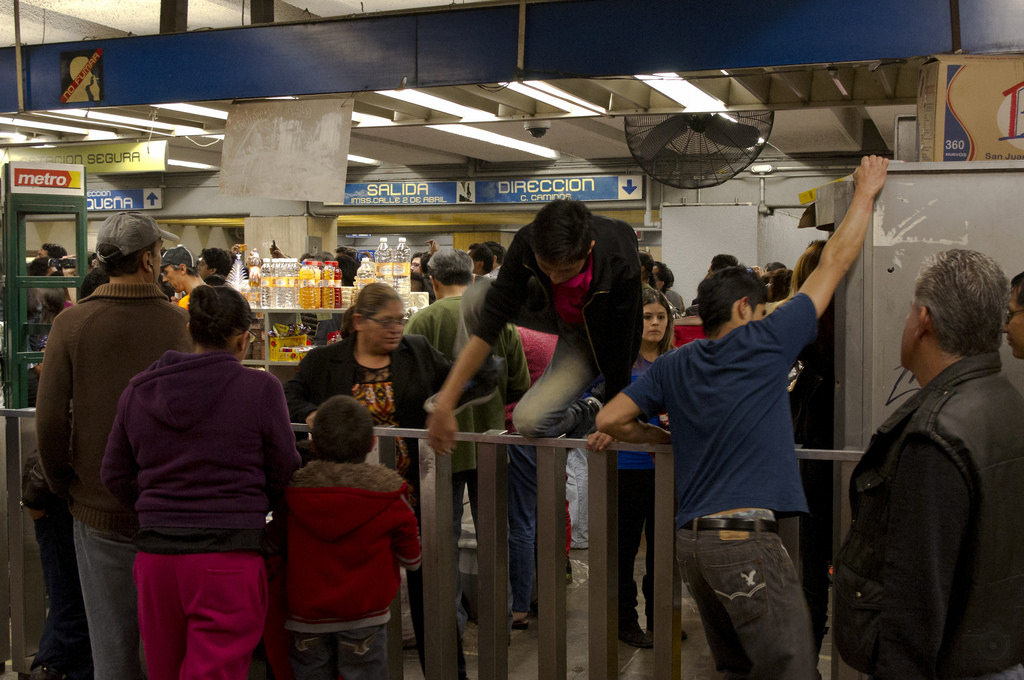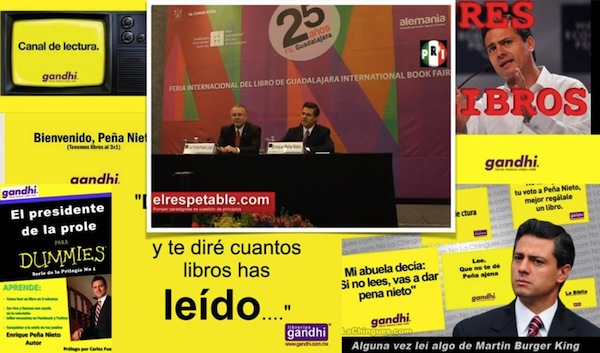
You can learn a lot about a culture though its social media memes. In Mexico City they have become a vehicle through which Mexico’s new middle class is asserting itself against the longstanding impunity of the country’s ruling elite. These viral memes, interestingly, are both the source of great pessimism and optimism for people, depending on how you see them.
Fear the cops
A good place to start is the evolving relationship between Mexican citizens and the police. In this meme from 2007, which you can find at, handily, Know Your Meme: Juan Pablo Carrasco was stopped by the local police for speeding in Juarez, Chihuahua, where news crews happened to be present on site. The footage (filmed by the crew) begins with Carrasco surrounded by several Mexican police officers, who were trying to get him to take a field sobriety test. Before complying with the procedures, Carrasco frantically responded with an outburst of “tengo miedo,” which means “I am afraid.” What tugs at the viewer is both how placid and professional he is while still being so insistent that an encounter with a cop is a reason to fear.
Shortly thereafter, Carrasco launched a website that sold “Tengo Miedo” T-shirts. Today “#tengomiedo” has evolved into a popular hashtag to ironically express fear.
Who are you calling a “wage-earner?”
This meme also began with a sobriety check. Two (clearly) drunk women were offended that a traffic cop suggested that they might have had a drink (or 10) before getting in their car. There are many astonishing aspects to this spectacle, including the fact that the most belligerent of the two women was part of the cast of Big Brother Mexico. But what is most astonishing is her use of “pinche asalariado” as an insult. Essentially, she called him a “fucking wage earner.” You know, someone who has to work for a living. And, apparently, in her distorted worldview, that is an insult.
The “Ladies de Polanco” was the first use of the word “lady” to describe a rich, clueless woman who takes advantage of her social status to behave irresponsibly in public. Ever since, not a month goes by without some news story about another lady. A compilation of the “five most famous ‘ladies’ of Mexico” is on YouTube.
Who are you calling an Indian?
Following the “Ladies de Polanco” it was inevitable that there would soon be a video of an obnoxious “gentleman.” Sure enough, a wealthy businessman, Miguel Sacal, filled the role when security cameras caught him beating the parking attendant of the building where he lives. It’s truly difficult to watch:
Sacal was angered because the parking attendant informed him that he wasn’t allowed to leave the desk unattended and so couldn’t repair the man’s flat tire. Having knocked out two of the man’s front teeth, Sacal yells “Now you see what I am made of … You don’t know who you are dealing with.” When two other men enter the frame, Sacal explains to them: “These bastards don’t want to do what I tell them.” Among the many insults used by Sacal, he calls the attendant a “pinche indio” (“fucking Indian”). Again, incredibly, simply calling someone indigenous is still treated as an insult by many Mexicans.
As soon as the video was uploaded to YouTube, people were outraged and a number of campaigns were launched to seek justice. Unfortunately, a few of these campaigns also focused on the fact that Sacal is of Jewish descent. In May 2012 he was sentenced to four years and three months in prison, a rare example of justice against a powerful individual.
Jumping turnstiles, naked
The Mexico City Metro is one of the largest, busiest, and cheapest subway systems in the world. In 2012, average daily ridership was just under 4.5 million. One can travel all the way from Tláhuac at the far south of the city to Ciudad Azteca in Ecatepec, Mexico State for just 25 cents. At least that was the fare until the beginning of this year when the cost per trip increased from 25 to 40 cents (from 3 to 5 pesos).
To protest the fare hike, many users of the metro began photographing themselves and their friends jumping the turnstiles. The campaign spread virally with the hashtag “#PosMeSalto,” which roughly translates as “well, then, I’ll just jump.” Inevitably, “PosMeSalto” led to a sub-genre of #fail videos, including this one:
In the same way that literature inevitably builds on the books of the past, memes in Mexico are often inspired by their predecessors. The week after subway riders protested the fare hike, leftist legislators rallied against anenergy reform bill that will allow for private investment in the oil industry. For some reason, one of these legislators decided to strip down to his undies in protest. Twitter users immediately dubbed this decision “#PosMeEncuero,” or “well, then, I’ll just get naked.” It’s a playful example of how Mexicans creatively address their feelings of powerlessness.
The almost-naked legislator then inspired the protesters of the metro fare hike who not only jumped the turnstiles, but did so in their underwear.
The president’s bookstore
Though Mexico has a strong literary tradition with greats like Octavio Paz, Carlos Fuentes, José Emilio Pacheco, Juan Rulfo, Elena Poniatowska, Elena Garro, and Rosario Castellanos, you don’t see as many Mexicans reading books in cafes and subway cars as you do in other Latin American countries such as Argentina and Colombia. This lack of appreciation for literature was most evident when President Peña Nieto was unable to correctly name a book that’s influenced his life, besides the Bible. Peña Nieto’s awkward stammering as he attempted to remember a single book title and confused the names of two of the country’s most influential writers was great fodder for the meme makers. #LibreríaPeñaNieto, or “Peña Nieto’s Bookstore” became a week-long sensation. Advertisements by the country’s largest book chain were altered to make fun of the then-presidential candidate:
Adding fuel to the fire, Peña Nieto’s daughter responded to her father’s critics on Twitter, calling them a “bunch of jackasses” that “form the proletariat” and envy what they don’t have. The wealthiest residents of New York City and Los Angeles do whatever they can to appear “proletarian,” but among Mexico’s elite it is still a put-down.
In reaction to her tweet, #SoyProle became a badge of honor. Others used “#ProLee” (“in favor of reading”) to emphasize that, maybe they’re not rich, but at least they can name three books.
Don’t you know who I am?
Though there have been many misbehaving “ladies” to choose from, #LadyProfeco is most illustrative of how social media is threatening the impunity long enjoyed by Mexico’s elite.
Lady Profeco is the moniker given to Andrea Benitez, the wealthy daughter of veteran political operative Humberto Benitez who was appointed to direct Profeco, the national consumer watchdog agency, when Peña Nieto was elected president. Andrea visited Maximo Bistrot, a trendy new restaurant in the Roma Sur neighborhood of Mexico City and expected to be seated immediately. Instead, she was told that she would have to wait for a table just like everyone else. Predictably, her response was: “You don’t know who you’re messing with.” The next day inspectors from Profeco, the agency her father directs, came to shut down the restaurant. As Manuel Rueda writes in Fusion:
As inspectors from Profeco began to shut down Maximo’s, several outraged dinner guests began to take pictures with their mobile phones. The unwanted attention apparently forced inspectors to quickly withdraw from the restaurant, but the damage was done.
From Twitter, the “Lady Profeco” case soon became the major news story in the country. Within days both Andrea Benitez and Humberto issued apologies and seven Profeco employees implicated in the scandal were fired. But the outcry continued so long as Humberto Benitez remained director of the agency. The following week President Peña Nieto announced that Benitez was stepping down as director, a rare case of impunity being trumped by public attention on an abuse of power.
These memes are snapshots of a society in transition, memories I will take with me as I return back to the United States, after four years in Mexico City. But hopefully for Mexican society they will someday lose their resonant familiarity, as blatant impunity becomes a thing of the past.





Send A Letter To the Editors